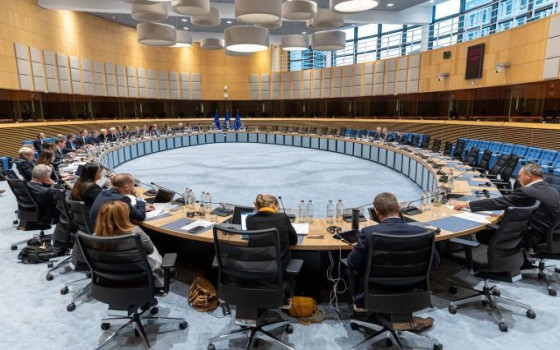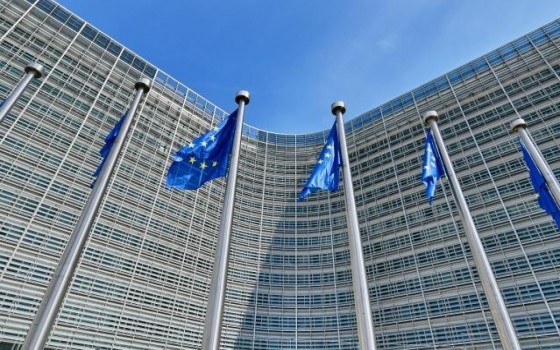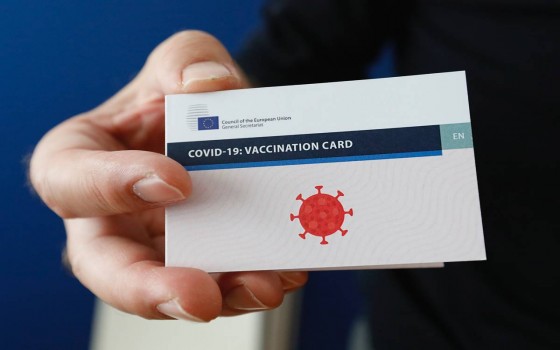
تحديث اللائحة الاوروبية لشحنات النفايات لضمان عدم تهديد صحة الانسان والبيئة وتشجيع استهدامها كمورد في الاقتصاد الدائري

- Europe and Arabs
- الجمعة , 17 نوفمبر 2023 15:15 م GMT
بروكسل : اوروبا والعرب
توصل مفاوضو المجلس والبرلمان الأوروبي فجر اليوم الجمعة إلى اتفاق سياسي مؤقت لتحديث اللائحة المتعلقة بشحنات النفايات.
وحسب بيان اوروبي صدر في بروكسل اليوم تهدف مراجعة اللائحة إلى تقليل شحنات النفايات الإشكالية إلى خارج الاتحاد الأوروبي، وتحديث إجراءات الشحن لتعكس أهداف الاقتصاد الدائري وتحسين التنفيذ.
وهو يضع إجراءات وأنظمة مراقبة لضمان أن الشحنات الدولية من النفايات لا تشكل تهديدًا لصحة الإنسان والبيئة، ولتشجيع استخدام النفايات كمورد في الاقتصاد الدائري داخل الاتحاد الأوروبي.
ويعتبر الاتفاق مؤقتا في انتظار اعتماده رسميا من قبل المؤسستين.
"إن احتضان النفايات كمورد قيم بدلاً من اعتبارها شيئًا يمكن التخلص منه أمر بالغ الأهمية لتحولنا إلى الاقتصاد الدائري. وستوفر لنا اتفاقية اليوم الإطار اللازم لاستعادة النفايات وإعادة استخدامها بشكل أفضل كمواد ثانوية. وفي الوقت نفسه، ستوفر لنا "ساعدونا في التأكد من أن النفايات التي نصدرها لن تكون ضارة بالبيئة وصحة الإنسان. اتفاق اليوم هو خطوة مهمة أخرى نحو أهداف الاتحاد الأوروبي في القضاء على التلوث والحياد المناخي".
بحسب مانقل البيان عن تيريزا ريبيرا رودريغيز، نائب رئيس الحكومة الإسبانية ووزيرة التحول البيئي والتحدي الديموغرافي والتي تتولى بلادها الرئاسة الدورية الحالية للاتحاد
واتفق المشرعون المشاركون على توسيع أهداف اللائحة لتشمل الحياد المناخي وتحقيق الاقتصاد الدائري وصفر تلوث.
تغطي الاتفاقية شحنات النفايات داخل الاتحاد الأوروبي (مع أو بدون عبور عبر دول ثالثة)، والنفايات المستوردة والمصدرة من وإلى دول ثالثة، وشحنات النفايات العابرة عبر الاتحاد الأوروبي إلى أو من دول ثالثة.
الشحنات داخل الاتحاد الأوروبي
ويحظر النص شحنات جميع النفايات المخصصة للتخلص منها داخل الاتحاد الأوروبي، إلا إذا تمت الموافقة عليها والترخيص بها بموجب شروط صارمة وفي حالات مبررة. سيتم السماح بشحنات النفايات داخل الاتحاد الأوروبي لعمليات الاسترداد بعد إجراء الإخطار الكتابي المسبق والموافقة ("PIC").
ويتضمن نص الاتفاقية استثناءً لشحنات النفايات المخصصة صراحة للتحليل والتجارب المعملية إذا كانت هذه النفايات لا تتجاوز 250 كجم. في هذه الحالة، يجب أن يتبع شحن هذه النفايات متطلبات المعلومات العامة الموضحة في اللائحة.
إجراءات الإخطار والجداول الزمنية
وفقًا لإجراءات "الموافقة المسبقة عن علم"، يتعين على المُخطرين داخل الاتحاد الأوروبي والمصدرين إلى دول ثالثة إخطار وتلقي تأكيد كتابي من دول الإرسال والمقصد والعبور قبل التصدير. يجب تقديم الإخطار والوثائق الأخرى التي تتطلبها اللائحة وتبادلها من خلال نظام إلكتروني مركزي تديره اللجنة.
وتحدد الاتفاقية جداول زمنية ومواعيد نهائية محددة لإجراءات الإخطار، وطلبات الحصول على معلومات إضافية من قبل السلطات المختصة، والقرارات التي تتخذها هذه السلطات بشأن صحة الإخطار. وستكفل الجداول الزمنية التي اتفق عليها المشرعون المشاركون عدم حدوث أي تأخير غير متناسب في تلك العمليات، بينما توفر في الوقت نفسه للسلطات المختصة الوقت الكافي للحصول على الوثائق وتقييمها وتحليل الطلبات والاستجابة لها خلال تلك العمليات.
ويحدد النص أيضًا الجداول الزمنية للمخطرين للرد على الموافقة الكتابية من السلطات المختصة وللمنشأة المتلقية لإبلاغ المخطر والسلطات المختصة باستلام النفايات.
ومن أجل توفير الشفافية، وافق المشرعون المشاركون على مطالبة المفوضية بتسهيل وصول الجمهور إلى المعلومات المتعلقة بشحنات النفايات من خلال نشر البيانات وتحديثها بانتظام حول إخطارات الشحنات عبر موقعها الإلكتروني.
صادرات النفايات
تحافظ الاتفاقية على الحظر المفروض على الدول الأعضاء لتصدير النفايات للتخلص منها إلى دول ثالثة وتصدير النفايات الخطرة المخصصة للاسترداد في البلدان غير الأعضاء في منظمة التعاون الاقتصادي والتنمية. بالنسبة للشحنات خارج الدول الأعضاء في الاتحاد الأوروبي، اتفق المشرعون المشاركون على أن مرافق إدارة النفايات في بلد المقصد يجب أن تخضع للتدقيق من قبل هيئات مستقلة. ستثبت عمليات التدقيق أن المنشآت تعالج النفايات بطريقة سليمة بيئيًا ولن يُسمح للمشغلين بتصدير النفايات إلى هذه المرافق إلا إذا كان الأمر كذلك.
وتتطلب القواعد الجديدة من المفوضية إنشاء سجل يحتوي على معلومات حديثة عن المنشآت التي خضعت للتدقيق لمساعدة مصدري النفايات على الاستعداد للشحنات.
تصدير النفايات البلاستيكية
يقدم الاتفاق المؤقت قواعد أكثر صرامة فيما يتعلق بتصدير النفايات البلاستيكية إلى دول ثالثة. وعلى وجه الخصوص، يتضمن حظرًا على تصدير النفايات البلاستيكية غير الخطرة (B3011) إلى البلدان غير الأعضاء في منظمة التعاون الاقتصادي والتنمية. وينص النص على إمكانية قيام الدول غير الأعضاء في منظمة التعاون الاقتصادي والتنمية بتقديم طلب إلى المفوضية، في موعد لا يتجاوز خمس سنوات بعد دخول اللائحة حيز التنفيذ، يوضح استعدادها لاستيراد النفايات البلاستيكية من الاتحاد الأوروبي، إذا استوفت إدارة صارمة للنفايات. المعايير. وفي حالة النتيجة الإيجابية لتقييم هذا الطلب، ستعتمد المفوضية قانونًا مفوضًا لرفع الحظر عن هذه الدول.
وافق المشرعون المشاركون على السماح بتصدير النفايات البلاستيكية غير الخطرة إلى دول منظمة التعاون الاقتصادي والتنمية، مع مراعاة إجراء الإخطار "PIC". ويدعو النص المفوضية إلى مراقبة صارمة لتصدير النفايات البلاستيكية إلى دول منظمة التعاون الاقتصادي والتنمية للتأكد من أن هذا التصدير ليس له تأثير كبير على البيئة أو صحة الإنسان وأن النفايات المستوردة من الاتحاد الأوروبي تتم إدارتها بشكل مناسب في هذه البلدان.
إجباري
ويدعو الاتفاق المؤقت الدول الأعضاء إلى وضع عقوبات فعالة ومتناسبة ورادعة لانتهاك الأحكام المنصوص عليها في اللوائح. وقد تشمل هذه، حيثما كان ذلك مناسبًا، الغرامات وإلغاء أو تعليق التراخيص المتعلقة بإدارة النفايات والشحنات مؤقتًا.
وتنص الاتفاقية أيضًا على متطلبات الدول الأعضاء لضمان تطبيق اللائحة بشكل فعال من خلال إنشاء آليات تعاون فعالة
على المستوى الوطني وبين الدول الأعضاء من خلال تبادل المعلومات ذات الصلة والممارسات الجيدة. ووافق المشرعون المشاركون على اقتراح المفوضية بإنشاء مجموعة إنفاذ لإنفاذ شحنات النفايات من شأنها تسهيل وتحسين التعاون والتنسيق بين الدول الأعضاء، من أجل منع واكتشاف الشحنات غير القانونية.
الخطوات التالية
سيتم الآن تقديم الاتفاقية المؤقتة إلى ممثلي الدول الأعضاء داخل المجلس (Coreper) وإلى لجنة البيئة بالبرلمان للمصادقة عليها. وإذا تمت الموافقة على النص، فسيحتاج بعد ذلك إلى اعتماده رسميًا من قبل المؤسستين، بعد المراجعة القانونية واللغوية، قبل نشره في الجريدة الرسمية للاتحاد الأوروبي ودخوله حيز التنفيذ.
خلفية
تنفذ لائحة شحن النفايات أحكام اتفاقية بازل بشأن التحكم في نقل النفايات الخطرة والتخلص منها عبر الحدود وقرار منظمة التعاون الاقتصادي والتنمية المرتبط بقانون الاتحاد الأوروبي. وتغطي اللائحة تصدير واستيراد النفايات من الاتحاد الأوروبي إلى دول ثالثة، وكذلك شحنات النفايات الخطرة وغير الخطرة بين الدول الأعضاء في الاتحاد الأوروبي. ويحظر بشكل خاص تصدير النفايات الخطرة من دول منظمة التعاون الاقتصادي والتنمية والاتحاد الأوروبي إلى دول خارج الاتحاد الأوروبي ودول خارج منظمة التعاون الاقتصادي والتنمية. وتحدد اللائحة أيضًا إجراءات الإخطار والموافقة على شحنات النفايات.
ومع ذلك، منذ اعتماد اللائحة في عام 2006، زادت صادرات النفايات من الاتحاد الأوروبي إلى بلدان ثالثة بشكل كبير، ولا سيما إلى البلدان غير الأعضاء في منظمة التعاون الاقتصادي والتنمية. وقد أدى عدم وجود أحكام مفصلة لضمان إدارة النفايات على نحو مستدام في بلدان المقصد إلى ضعف التنفيذ وتحديات بيئية وصحية عامة في تلك البلدان.
اعتمدت المفوضية اقتراحها لتحديث لائحة شحن النفايات في 17 نوفمبر 2021. وتوصل البرلمان الأوروبي إلى موقفه في يناير 2023، بينما اعتمد المجلس تفويضه التفاوضي في مارس 2023.












لا يوجد تعليقات